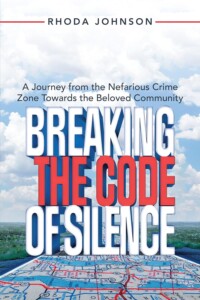Title: Breaking the Code of Silence
Subtitle: A Journey from the Nefarious Crime Zone Towards the Beloved Community
Author: Rhoda Johnson
Publisher: XlibrisUS
ISBN: 9781669868637
Pages: 86
Genre: Self-Help
Reviewed by: David Allen
Pacific Book Review
This extraordinary book, a tour de force really, straddles the so-called ‘nefarious zone’ (i.e., the criminal justice system), the world of offenders (particularly juvenile inner-city ones), their time in court, and most fascinatingly, the world of human trafficking.
The author, Rhoda Johnson, a retired professor and estimable scholar, accomplishes this most impressive feat by drawing upon her own experience growing up in a town of 30,000 in the American South; by drawing with great deliberateness and tact upon historical event and recent history; by tapping into ancient sources of wisdom such as Lao Tzu and On the Art of War. Each of the exertions are not only writerly but powerful and effective too. Without once alienating readers lacking doctoral degrees, this book in an utterly conversational and convincing way brings serious scholarship and serious recent history to bear.
We’re talking about George Floyd. We’re talking Black Lives Matter. We’re talking #MeToo. In fact, we are staring at the livid or mute or sometimes criminal faces of all marginalized, undereducated, underemployed people everywhere. The mission of this book – and it succeeds – is to draw the seemingly disparate threads together into a coherent whole that argues – no, pleads – for progress, for healing community, and for thoughtful action. No one gets left behind is the loving motif throughout this slim volume, whose brevity leaves this reader wanting more.
To that point: another word about the writing. In this fascinating monograph, the form, the very structure of the sentences, is the content. Throughout, Rhoda Johnson describes the Tantalus-like, illimitable but always horrible incursions of the nefarious zone in terms that are absolutely shattered. The passive (victim) voice is ultimately shocking and unacceptable to Johnson and to readers. The narrative is couched in the language of learned bitter helplessness, reminiscent of James Baldwin, another outspoken champion for awareness and change.
I really like this book: can you tell? If you are interested in learning more about our partially traduced national heritage, and about the steps, remote as they may seem, that can be taken to improve things societally, Breaking the Code of Silence is for you. A winner by all measures.


